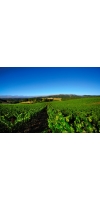Wine from Jada Vineyard and Winery

Jada Vineyard lies in a incredible pocket of the Templeton Gap/Willow Creek District, blessed with cooling coastal air and abundant sunshine throughout the growing season. With sustainability and minimizing their environmental footprint a focus of their winegrowing program, Jada has embraced organic and biodynamic farming techniques and last year, received a SWEEP grant from the CDFA for their commitment to sustainability.
To their winemaker, Josh Harp, the beauty of the land here is found beneath the surface and it's the reason the Messina Family, back in 1999, purchased this 95 acre hillside estate on the West-side of Paso Robles. Under a shallow topsoil of clay loam lie massive deposits of calcareous shale and pockets of limestone. This challenging environment contributes to reduced vigor in the vines and decreased berry size, which plays a huge part in the intensity of their fruit and imparts a complex underlying minerality to their wines. Harvest at Jada generally begins near the end of September and the beginning of October allowing for a long maturation process that results in superb development of color & intensity in character while maintaining acidity.
Jada's approach has always been one of "sustainable excellence" - avoiding short-cuts and focusing on those improvements that would increase wine quality year after year. They are proud today to celebrate their 13th vintage making estate wines, their 95th "90/+" wine rating, and their 11th anniversary, since opening the Tasting Room doors in 2008.
Currently, the ranch is planted to 48 acres of Rhone and Bordeaux varietals, making under 5,000 cases to support the Wine Club and Tasting Room. All you have to do to be a part of this amazing effort is sit back, relax, sip, and enjoy!
No products found
- back
Selected Options
Wineries
Categories
Pricing
Countries
Regions
Grape Types
Wineries
Organic/Free Shipping
Yalumba The Steeple Shiraz is made from 100 percent Shiraz.
The nose is immersed in blueberries and plums leading into very inviting red spices, cranberries and pomegranate. Medium to full-bodied, it is generous with plump fruits and dark cherries. Textural, intriguing and velvety smooth.
Review:
This reminds us of the classic Australian reds of the 1950s and 1960s. Very deep and rich, yet so vibrant and youthful, this has fresh-herb and savory complexity alongside the black-fruit aromas. Great muscular tannins on the powerful palate give it wonderful vitality and clarity. Just a touch of eucalyptus. Very long finish with a wonderfully velvety texture. From vines planted in 1919. Excellent aging potential.
-James Suckling 97 Points
Babylons Peak Pinotage is made from 100 percent Pinotage.
Babylon's Peak winery, situated on the highest weathered granite slopes of the Paardeberg Mountain, is privately owned by the Basson family who has passed down the tradition, passion and art of winemaking over four generations. Predominantly low-yield dryland bushvines are selected to produce these excellent wines with distinctive character.
Dark red color, with ripe plums and mocha on the nose. Dark fruit followed by spice on the palate. A well balanced wine with smooth integrated tannins.
The Pinotage is dryland bushvines, planted on the highest south-east facing granite slopes on the farm. Due to its unique terroir, this vineyard ripens slowly over a very long period. This results in very dark color, soft tannins and good flavor compounds. The baboons normally harvest their quantity first and we pick the rest.
The grapes were harvested by hand at 25,6°B.and destalked only. No crushing was done. Cold maceration was done before fermentation started in open fermenters. The grapes fermented between 24-26°C for 5-7 days, after which the wine was taken to barrels where it went through malolactic fermentation. After malolactic fermentation was completed, the wine spent 12 months in 225 liter French oak barrels until bottling.
Pairs with lamb, bobotie and braaied red meat.




